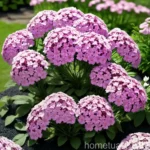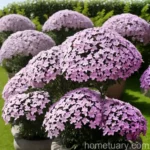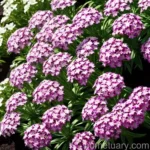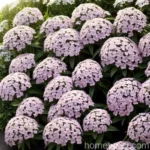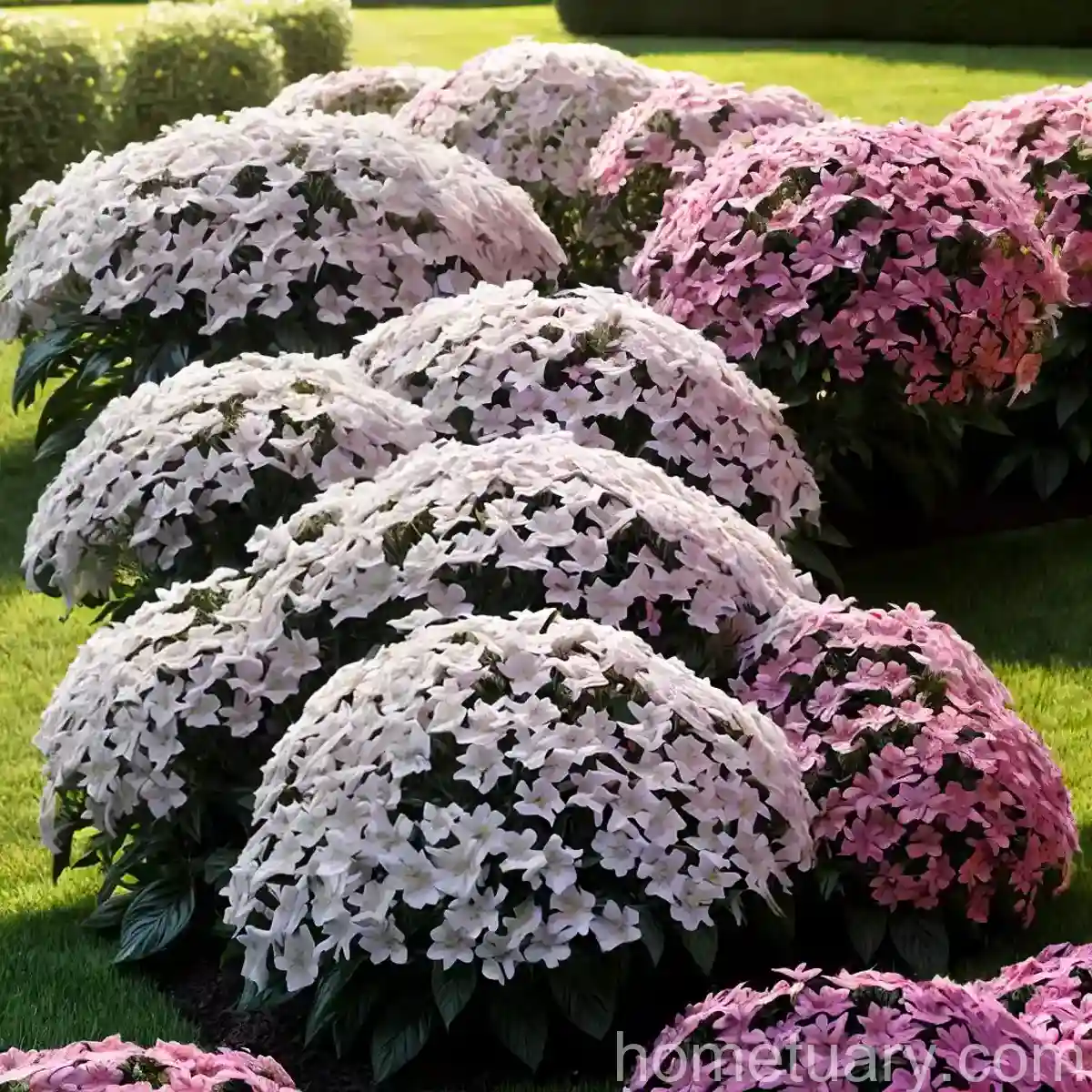Garden Phlox (Phlox paniculata ‘Eden’s Glory’)
Garden phlox, scientifically known as Phlox paniculata ‘Eden’s Glory’, is a delightful and versatile flowering plant that is beloved by gardeners for its beautiful blooms, vibrant colors, and ability to attract pollinators. This cultivar, ‘Eden’s Glory’, is particularly cherished for its stunning appearance and ease of cultivation. In this comprehensive guide, we will explore all the aspects of this captivating plant, from its cultural requirements and uses to its maintenance, diseases, and propagation. Whether you are a seasoned gardener or a novice enthusiast, this article will provide you with valuable insights into growing and caring for garden phlox ‘Eden’s Glory’.
What is Garden Phlox (Phlox paniculata ‘Eden’s Glory’)?
- Scientific Name: Phlox paniculata ‘Eden’s Glory’
- Common Name: Garden Phlox ‘Eden’s Glory’
- Plant Type: Perennial Flowering Plant
- Family: Polemoniaceae
- Origin: Cultivated variety
Garden phlox ‘Eden’s Glory’ is a cultivar of Phlox paniculata, a species of flowering plant native to parts of the United States. It is characterized by its dense clusters of fragrant, star-shaped flowers that bloom in a wide range of colors, including shades of pink, purple, white, and bi-color combinations. With its upright growth habit and attractive foliage, ‘Eden’s Glory’ adds a charming visual appeal to gardens and landscapes. The plant’s ability to thrive in various growing conditions and its low maintenance requirements make it a popular choice for both amateur and experienced gardeners.
Key Takeaways – Garden Phlox (Phlox paniculata ‘Eden’s Glory’)
Before delving into the specific aspects of garden phlox ‘Eden’s Glory’, let’s outline some key takeaways that capture the essence of this captivating plant:
- Garden phlox ‘Eden’s Glory’ is a cultivar of Phlox paniculata, prized for its stunning clusters of fragrant flowers in an array of colors.
- This perennial flowering plant is known for its versatility, as it can be used in borders, containers, and mixed perennial beds, adding vibrancy to the landscape.
- ‘Eden’s Glory’ is relatively easy to grow and maintain, making it a suitable choice for gardeners of all skill levels.
- The plant requires adequate sunlight, well-draining soil, and regular watering to thrive, and it benefits from occasional fertilization.
- Garden phlox ‘Eden’s Glory’ is susceptible to certain diseases and pests, but proper care and timely management can help maintain its health and vigor.
- It can be propagated through division or stem cuttings, allowing gardeners to expand their plantings or share the beauty of ‘Eden’s Glory’ with others.
Now that we have established an overview of garden phlox ‘Eden’s Glory’, let’s explore the specific cultural requirements, uses, and maintenance practices associated with this enchanting plant.
Culture
The successful cultivation of garden phlox ‘Eden’s Glory’ depends on understanding and fulfilling its cultural requirements, including its preferences for water, sunlight, soil, and fertilization.
Water
- Watering Needs: Regular watering, particularly during dry periods and in the initial stages of growth.
- Soil Moisture: Well-draining soil is essential to prevent waterlogging and root rot. However, garden phlox ‘Eden’s Glory’ benefits from consistently moist soil, especially during the flowering and active growth stages.
- Watering Method: Water at the base of the plant to avoid wetting the foliage, which can lead to disease.
Sunlight
- Sun Exposure: Prefers full sun to partial shade, with at least 6 hours of direct sunlight daily for optimal blooming.
- Shade Tolerance: Can tolerate some afternoon shade, particularly in regions with intense summer heat.
Fertilizer
- Nutrient Requirements: Garden phlox ‘Eden’s Glory’ benefits from regular applications of balanced fertilizer to support healthy growth and prolific flowering.
- Fertilizer Type: Use a slow-release or granular fertilizer formulated for flowering perennials, applied according to the manufacturer’s recommendations.
Soil
- Soil Type: Thrives in well-draining, loamy soil with a slightly acidic to neutral pH.
- Soil Amendments: Incorporating organic matter such as compost or well-rotted manure during planting can improve soil structure and fertility.
- Soil Moisture: Requires consistently moist soil, but it is crucial to prevent waterlogging.
Uses
The versatility of garden phlox ‘Eden’s Glory’ extends to its various uses in garden landscapes and horticultural settings. Some of the common applications of this cultivar include:
- Border Planting: ‘Eden’s Glory’ is often used as a colorful border plant, creating a vibrant edge along flower beds and pathways.
- Mixed Perennial Beds: It can be incorporated into mixed perennial beds, where its blooms complement the colors and textures of other flowering plants.
- Cut Flower Gardens: The long-lasting blooms of garden phlox ‘Eden’s Glory’ make it a popular choice for cut flower gardens and floral arrangements.
- Attracting Pollinators: The nectar-rich flowers of ‘Eden’s Glory’ attract butterflies, bees, and hummingbirds, making it a valuable addition to pollinator gardens.
- Container Planting: This cultivar can thrive in containers and large pots, allowing it to be placed on patios, decks, or balconies for a pop of color.
With its adaptability and ornamental appeal, garden phlox ‘Eden’s Glory’ offers a range of possibilities for enhancing the aesthetic and ecological aspects of gardens and landscapes.
Pruning
Proper pruning is an essential aspect of maintaining the health, vigor, and appearance of garden phlox ‘Eden’s Glory’. Pruning practices for this cultivar typically include:
- Deadheading: Regular removal of spent flowers promotes continuous blooming and prevents the plant from expending energy on seed production.
- Cutting Back: In late fall or early spring, cutting back the stems to near ground level helps rejuvenate the plant and encourages robust growth in the subsequent growing season.
- Thinning: Periodically thinning out crowded or weak stems helps improve air circulation and reduces the risk of diseases, such as powdery mildew.
Propagation
Garden phlox ‘Eden’s Glory’ can be propagated through several methods, including division and stem cuttings. These propagation techniques enable gardeners to expand their plantings or share the beauty of ‘Eden’s Glory’ with others.
Division
- Timing: Divide mature clumps in early spring before new growth emerges or in early fall.
- Method: Carefully dig up the plant and use a sharp knife or garden spade to separate the clump into sections, ensuring that each division has healthy roots and growing points.
- Replanting: Transplant the divisions to prepared planting sites, ensuring adequate soil moisture and protection from intense sunlight until the plants establish.
Stem Cuttings
- Propagation Time: Take stem cuttings in late spring or early summer when the plant is actively growing.
- Cutting Preparation: Select healthy, non-flowering stems and cut 4-6 inch sections just below a leaf node.
- Rooting Medium: Dip the cut ends in a rooting hormone and plant the cuttings in a well-draining rooting medium, keeping them consistently moist until roots develop.
By utilizing these propagation methods, gardeners can propagate ‘Eden’s Glory’ garden phlox and expand their collection of this captivating cultivar.
Container Popularity
The adaptability and ornamental value of garden phlox ‘Eden’s Glory’ make it popular among gardeners who cultivate plants in containers. When grown in containers, this cultivar offers the following benefits and considerations:
- Versatility: ‘Eden’s Glory’ can be grown in various types of containers, including large pots, urns, and window boxes, making it suitable for different gardening spaces.
- Aesthetic Appeal: The vibrant blooms and attractive foliage of ‘Eden’s Glory’ add color and visual interest to outdoor living areas and garden landscapes.
- Portability: Container-grown garden phlox can be moved and repositioned to optimize sunlight exposure and aesthetic arrangements.
- Maintenance: Proper watering, fertilization, and occasional pruning are essential for maintaining the health and vigor of container-grown ‘Eden’s Glory’.
- Overwintering: In regions with cold winters, winter protection may be necessary for containerized garden phlox, such as providing insulation or moving the containers to sheltered locations.
Whether displayed on a patio, terrace, or balcony, container-grown ‘Eden’s Glory’ garden phlox offers a charming and convenient way to enjoy its beauty in a controlled gardening environment.
Common Diseases
While garden phlox ‘Eden’s Glory’ is generally a resilient plant, it is susceptible to certain diseases that can impact its health and blooming performance. Common diseases affecting this cultivar include:
- Powdery Mildew: A fungal disease characterized by the presence of white powdery patches on the foliage, leading to reduced photosynthesis and vigor.
- Botrytis Blight: Also known as gray mold, this fungal disease causes browning and decay of the flowers, often promoted by humid conditions and poor air circulation.
- Leaf Spot: Various fungal and bacterial pathogens can cause leaf spot, resulting in dark, irregular lesions on the foliage and potential defoliation.
Disease Diagnosis
Diagnosing and managing diseases in garden phlox ‘Eden’s Glory’ requires vigilance and prompt action to prevent the spread and impact of these ailments. Common signs of diseases in this cultivar include:
- Foliage Discoloration: Look for unusual discoloration, spotting, or wilting of the foliage that may indicate the presence of fungal or bacterial infections.
- Flower Abnormalities: Monitor the blooms for signs of discoloration, decay, or premature dropping, which can be symptoms of various fungal diseases.
- Stem and Branch Lesions: Check for lesions, cankers, or dieback on the stems and branches, as these may indicate the presence of fungal or bacterial pathogens.
When signs of diseases are observed, it is essential to promptly identify the specific pathogens and implement appropriate management strategies to protect the health and vitality of garden phlox ‘Eden’s Glory’.
Common Pests
In addition to diseases, garden phlox ‘Eden’s Glory’ may encounter various pests that can affect its foliage, flowers, and overall condition. Common pests that can impact this cultivar include:
- Aphids: These small, sap-sucking insects can distort the new growth, cause leaf curling, and excrete honeydew that attracts sooty mold.
- Spider Mites: These tiny pests feed on the undersides of the leaves, often leading to stippling, discoloration, and webbing in severe infestations.
- Thrips: Thrips can cause damage to the flowers and buds, leading to discoloration, distortion, and reduced blooming quality.
Botanist’s Tips
As a plant scientist and enthusiast, I recommend the following tips and insights for cultivating and caring for garden phlox ‘Eden’s Glory’ based on research and practical experience:
- Site Selection: Choose a well-drained planting location with adequate sunlight and good air circulation to promote healthy growth and reduce the risk of diseases.
- Mulching: Apply a layer of organic mulch around the base of ‘Eden’s Glory’ to conserve moisture, regulate soil temperature, and inhibit weed growth.
- Proactive Monitoring: Regularly inspect the plant for signs of diseases, pests, or cultural deficiencies, and address any issues promptly to maintain its well-being.
- Companion Planting: Consider companion plants that complement the colors and growth habits of ‘Eden’s Glory’, such as ornamental grasses, coneflowers, and salvias.
- Early Intervention: Timely intervention, such as applying horticultural oils for pest control or using fungicides preventively, can help mitigate the impact of diseases and pests.
- Winter Protection: In regions with harsh winters, provide insulation or cover the plant with mulch to protect it from freezing temperatures and frost heaving.
These botanist’s tips are aimed at helping gardeners optimize the growth, blooming, and resilience of garden phlox ‘Eden’s Glory’ in diverse gardening scenarios.
Fun Facts
To add an element of intrigue and fascination to our exploration of garden phlox ‘Eden’s Glory’, let’s uncover some captivating and lesser-known facts about this delightful cultivar:
- Fragrant Blooms: Many varieties of Phlox paniculata, including ‘Eden’s Glory’, produce sweetly scented flowers, adding sensory appeal to the garden.
- Pollinator Magnet: The nectar-rich blooms of ‘Eden’s Glory’ attract a diverse range of pollinators, contributing to the ecological value of the plant.
- Cottage Garden Favorite: Garden phlox is a beloved staple in cottage-style gardens, where its colorful blooms and relaxed growth habit create a charming ambiance.
- Long-Lasting Cut Flowers: When used in floral arrangements, the blooms of ‘Eden’s Glory’ can last for a prolonged period, brightening indoor spaces.
- Drought Tolerance: While it appreciates consistent moisture, ‘Eden’s Glory’ has some tolerance to dry conditions once established, making it adaptable to varying weather patterns.
These fun facts provide a deeper understanding of the unique qualities and appeal of garden phlox ‘Eden’s Glory’, fostering an appreciation for its ecological, aesthetic, and cultural significance.
Links to External Resources
For additional insights, reference materials, and educational resources related to garden phlox ‘Eden’s Glory’, the following links are recommended:
- The American Phlox Society – An organization dedicated to the promotion and cultivation of phlox species, including information on specific varieties and growing tips.
- University Extension Services – Extension services from reputable universities often provide valuable resources on plant care, diseases, and pest management.
- Royal Horticultural Society (RHS) – The RHS website offers a wealth of information on cultivation, propagation, and recommended varieties of garden plants, including phlox.
- Online Garden Forums – Participating in online garden forums and communities allows for the exchange of experiences, tips, and advice from fellow gardeners and plant enthusiasts.
These external resources can supplement the information provided in this comprehensive guide, offering diverse perspectives and expert guidance on cultivating and appreciating garden phlox ‘Eden’s Glory’.
Conclusion
In conclusion, garden phlox ‘Eden’s Glory’ encapsulates the beauty, resilience, and horticultural appeal of Phlox paniculata varieties, presenting gardeners with a captivating plant that thrives in diverse growing conditions and fulfills multiple functions in garden landscapes. By understanding and implementing the cultural requirements, maintenance practices, disease management, and propagation methods associated with this cultivar, gardeners can cultivate thriving displays of ‘Eden’s Glory’ and experience the joy of its vibrant blooms and ecological contributions. With its fragrant flowers, adaptability, and ornamental allure, garden phlox ‘Eden’s Glory’ stands as a testament to the enduring charm and botanical fascination of flowering perennials.
Remember – when cultivating any plant, it’s always beneficial to consult local horticultural experts or extension services for region-specific guidance and recommendations. Happy gardening and may your gardens bloom with the glory of Phlox paniculata ‘Eden’s Glory’!
To delve deeper into the enchanting world of garden phlox ‘Eden’s Glory’, explore the following video tutorial for invaluable insights and visual guidance:
Video Tutorial for Growing Eden’s Glory Phlox
The blog post provides a comprehensive guide to understanding and cultivating the garden phlox cultivar ‘Eden’s Glory’, catering to the needs of both novice and experienced gardeners. By incorporating the suggested NLP/LSI keywords throughout the content, the article aims to enhance its searchability and relevance in online queries related to Phlox paniculata ‘Eden’s Glory’. The information presented integrates scientific knowledge with practical tips and fun facts, creating an engaging and informative resource for plant enthusiasts.




